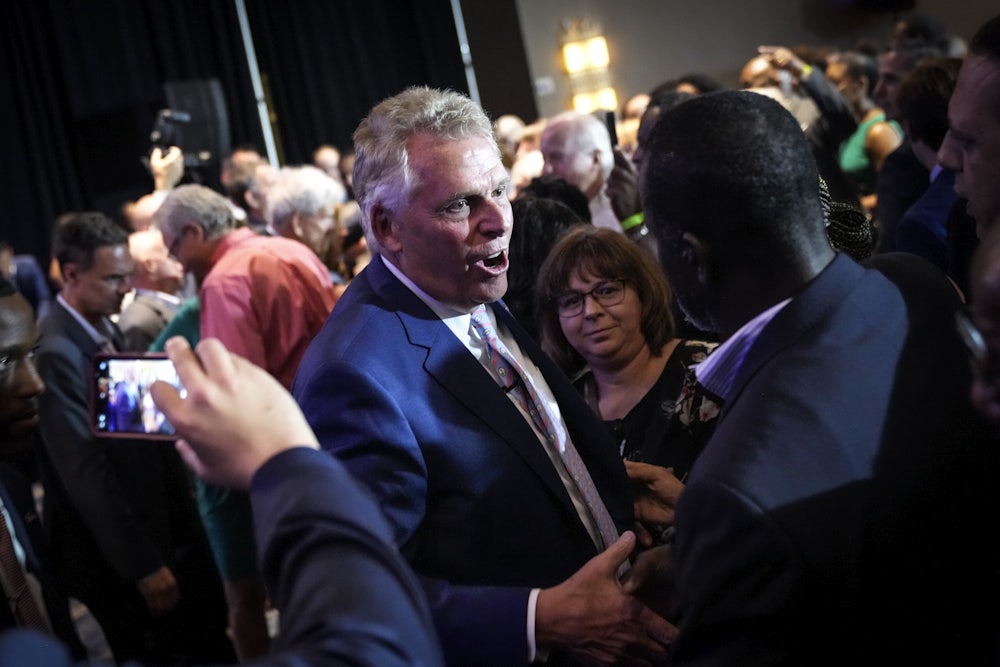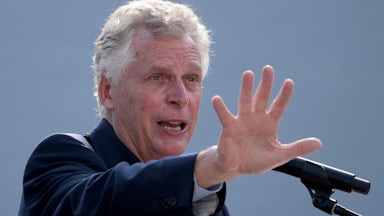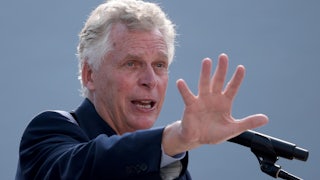A law that went into effect in a state more than 1,000 miles away may have the power to reshape the November election in Virginia.
When the Supreme Court refused to block a Texas law banning abortion after six weeks earlier this month, Terry McAuliffe, the once and perhaps future governor of the commonwealth of Virginia, was quick to tie his Republican opponent to the measure.
“This dangerous Texas law is exactly what Glenn Youngkin has in mind when he says he wants to go ‘on offense’ to ban abortion in the Commonwealth,” McAuliffe said in a statement, quoting from a leaked video in which the Republican nominee said he would target abortion rights.
In that video, which apparently was shot at a campaign event in Loudoun County in June, Youngkin also said that he “can’t” talk about abortion on the campaign trail because it “won’t win my independent votes that I have to get.”
Thanks to the law in Texas and concerns that the conservative-majority Supreme Court may soon overturn Roe v. Wade, abortion is now a major topic of conversation in the Virginia gubernatorial race—and it will likely help fire up potential McAuliffe voters in the waning weeks of the campaign.
“This has happened at a time that is almost perfect for Terry McAuliffe and the other Democratic candidates in Virginia,” said Larry Sabato, the director of the Center of Politics at the University of Virginia and editor in chief of Sabato’s Crystal Ball.
Abortion had been largely on the back burner of a gubernatorial campaign more focused on political issues arising from the pandemic, such as masks and vaccine mandates. An August poll by Monmouth University, which showed McAuliffe leading Youngkin by five percentage points, found many voters rating the pandemic, the economy, and education as the most important issues in the election. Only 4 percent of voters listed abortion as a top issue. But the Texas law, and the Supreme Court’s decision to uphold it, have brought the topic back to the forefront of the campaign.
“When you think that your rights are secure, you’re much less likely to vote on them. Well, after the Supreme Court sent this signal about the Texas law, this is real again,” Sabato said.
McAuliffe’s campaign launched two TV ads focused on abortion days before the Texas law took effect and has repeatedly reaffirmed that McAuliffe will be a “brick wall” for protecting abortion rights if elected again. In a conference call with reporters last week, he called on businesses to relocate from Texas to Virginia, as “a state that respects women’s individual rights.”
McAuliffe and the other Democratic nominees for the top of the ticket, lieutenant governor candidate Hala Ayala and Attorney General Mark Herring, who is seeking a third term, have all reaffirmed their support for abortion rights in recent days.
“The Democratic team here is all together to say we will make sure that we protect women’s rights, we will be brick walls to protect women’s rights,” McAuliffe said in a press conference with Ayala and Herring on Tuesday, warning that Youngkin would support “a Texas-style law” if elected.
Youngkin has said that McAuliffe has “extreme views” on abortion that he is using to divide Virginians on the issue, and reaffirmed that he is against abortion in most cases, with exceptions for rape, incest, and cases where the mother’s life is in jeopardy. The Texas law makes no such exceptions. Republican lieutenant-gubernatorial candidate Winsome Sears told Newsmax that she would support a Texas-style bill, although her campaign noted that such a measure would be unlikely to pass in the General Assembly, The Washington Post reported.
If past is prologue, the new Texas law may do more to juice support among supporters of abortion rights than anti-abortion activists. In 1989, voters narrowly elected Democrat Douglas Wilder, the first Black governor elected in the United States since the Reconstruction era. Wilder had touted his support for abortion rights, particularly in the wake of a Supreme Court decision that summer that upheld a Missouri law restricting use of state funds for abortions. Abortion rights became an overriding issue for that campaign, ultimately benefiting Wilder over his Republican opponent.
“If [Wilder] could do it in 1989, I would think that a Democrat in the Virginia of today would do quite well,” Sabato said of the efficacy of campaigning on abortion rights.
Two decades after Wilder was elected, in 2012, Republican Governor Bob McDonnell signed into law a controversial bill that required an abdominal ultrasound procedure to obtain an abortion. The following year, Virginia elected McAuliffe, who as governor vetoed every bill restricting reproductive rights passed by the Republican-controlled legislature. (Virginia governors are limited by state law to one term but can run for multiple nonconsecutive turns.) In 2017, current Democratic Governor Ralph Northam was elected, and in 2019, Democrats took control of the state legislature.
“That mandatory ultrasound law … cost Republicans a lot and has continued to cost them a lot over the past few election cycles,” said Tarina Keene, the executive director of NARAL Pro-Choice Virginia, which has endorsed the Democratic ticket. The ultrasound law was repealed by the new Democratic majority in 2020.
There are always concerns among operatives in both parties that voters won’t turn out in an election year without a national ticket. Keene said that the upheaval of the Trump presidency in particular “wore a lot of people out,” and that voters may be tired of turning out for yet another election. But the new developments on abortion rights may change that calculus.
“The working fear here on the ground is that people are not going to feel the same kind of urgency to get out and vote, but I think that the particular action by Texas and subsequently the Supreme Court is definitely going to motivate them now,” she said.
Sabato argued that voters who oppose abortion rights won’t be more inspired by the Texas law to turn out to support Youngkin, because they were already going to vote for him—they make up the core of the Republican base in the state. But the fight for abortion rights could “cure the malady” for otherwise apathetic Democratic voters less likely to vote in an off-year. As a collateral effect, this potential increased turnout could also help Democrats keep the state legislature.
“Republicans have lost for so long in this state—lost everything, for the last decade—they’re determined to win something. So they’re already excited,” Sabato said. “The advantage to McAuliffe and the Democrats is, this actually gets Democrats excited.”
As the campaign kicks into gear in the final weeks before the election—and as early voting begins on September 17—Keene said that NARAL Pro-Choice Virginia will be canvassing in more urban areas, such as Richmond and Hampton Roads, as well as doing phone banking, mail and literature drops, and town halls in coordination with partners.
“This is something that I don’t believe the voters of Virginia will let stand, and they will come out and vote,” Keene said.
Carolyn Fiddler, a state elections expert and the communications director for Daily Kos, a left-leaning media platform that does frequent election polling, guessed that the latest news from Texas would likely juice turnout in northern Virginia, which leans Democratic and is more attuned to national political trends, thanks to its proximity to Washington, D.C.
“We’re probably hyperaware of what’s going on in Texas,” Fiddler said about the region.
It may seem odd that a law in Texas could affect an election in a different state, but it has far-reaching implications for national politics. Several Republican-controlled legislatures will likely try to craft copycat bills limiting abortion, fueled by the assent of the Supreme Court. Abortion rights supporters worry that the conservative majority will take the opportunity to overturn Roe with a case on Mississippi law that is on the court’s docket this year. And with a deadlocked Congress unable to codify Roe into law, the impetus for action—either to restrict or enshrine abortion rights—is on the states.
“Because folks on either side of the issue can’t reasonably expect federal legislative action on it, the fight has been in the states for a long time and will continue to be in the states,” Fiddler said. “It makes sense that something in Texas could have extensive ripple effects nationwide.”








